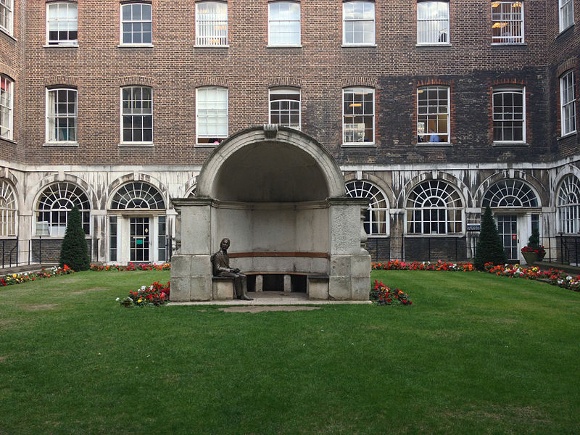John Keats, selected poems Contents
- Social and political context
- Religious and philosophical context
- Literary context
- Bright Star! Would I were steadfast as thou
- The Eve of St Agnes
- ‘Hush, hush! tread softly! hush, hush, my dear!’
- Isabella: or The Pot of Basil
- La Belle Dame Sans Merci
- Lamia
- Lines to Fanny (‘What can I do to drive away’)
- O Solitude, if I must with thee dwell
- Ode on a Grecian Urn
- Ode on Indolence
- Ode to a Nightingale
- Ode to Autumn
- Ode to Melancholy
- Ode to Psyche
- On First Looking Into Chapman’s Homer
- On Seeing the Elgin Marbles
- On the Sea
- Sleep and Poetry
- Time’s sea hath been five years at its slow ebb
- To Ailsa Rock
- To Leigh Hunt
- To Mrs Reynolds’s Cat
- To My Brothers
- To Sleep
- When I have fears that I may cease to be
The medical profession
The apprentice surgeon
Between 1811 and 1814 Keats studied anatomy and physiology as an apprentice surgeon. For someone of Keats’ limited financial means, surgery would have been a respectable profession and one which did not require a university degree. Surgeons were licensed as general practitioners and would have performed medical procedures such as setting bones, dressing wounds and administering vaccinations.
Although enthusiastic about a profession which would allow him to help people, Keats seems to have become increasingly lonely and restless in these years and was reliant on the Clarkes at their school in Enfield for emotional and intellectual nourishment. It was during this time that Keats ‘devoured’, in Cowden Clarke’s words, texts such as Ovid’s Metamorphoses, Milton’s Paradise Lost, Virgil’s Eclogues and – perhaps the strongest influence on his development as a writer – Spenser’s The Faerie Queene. Sometime in 1814 Keats wrote his first poem In Imitation of Spenser.
Guy’s Hospital
 Keats left his apprenticeship with Hammond in 1815 and moved to London, registering at Guy’s Hospital for the six-month course necessary to become a licensed surgeon and apothecary. He lived in the Borough, south of London Bridge and near to where his family was now living, his grandmother having died in 1814. At the hospital, Keats became a ‘dresser’ whose duties included dressing wounds, setting bones and helping to prevent infection. He attended lectures given by Astley Cooper, the leading surgeon of the time, and also followed courses in anatomy, physiology, chemistry and medical practice.
Keats left his apprenticeship with Hammond in 1815 and moved to London, registering at Guy’s Hospital for the six-month course necessary to become a licensed surgeon and apothecary. He lived in the Borough, south of London Bridge and near to where his family was now living, his grandmother having died in 1814. At the hospital, Keats became a ‘dresser’ whose duties included dressing wounds, setting bones and helping to prevent infection. He attended lectures given by Astley Cooper, the leading surgeon of the time, and also followed courses in anatomy, physiology, chemistry and medical practice. In July 1816 Keats passed the qualifying examinations to become a surgeon. After a holiday in the seaside resort of Margate, Keats returned to London again in September. He worked as a dresser until his twenty-first birthday (in October), the necessary age to start practising as a surgeon. It was at this time that Cowden Clarke invited Keats to his rooms in Clerkenwell to show him a 1616 folio edition of George Chapman’s translation of Homer, a volume which inspired Keats’ best poem thus far: On first looking into Chapman’s Homer. The poem was published in The Examiner on December 1, 1816.
43Bc- AD17. Latin poet born in Italy. His major works are Ars amatoria (Art of Love) and Metamorphoses.
(1608-1674) English poet, most famous for his epic poem, Paradise Lost.
The epic poem by the 17th-century English poet John Milton.
Publius Virgilius Maro (70-19 BCE) was a Roman poet who wrote the Aeneid, an epic poem about the Trojan Wars.
16th century English poet
1. A person who makes drugs, a pharmacist; 2. the shop where medicines are sold.
(9th or 8th century BCE). Greek poet to whom the highly-influential, epic poems, The Iliad and The Odyssey, were attributed.
Recently Viewed
-
John Keats, selected poems » The medical profession
now -
John Keats, selected poems » The context of John Keats' poetry
just now -
John Keats, selected poems » On the Sea: Language, tone and structure
just now -
John Keats, selected poems » Ode on a Grecian Urn: Language, tone and structure
2 minutes ago -
John Keats, selected poems » Hush, hush! tread softly! - Language, tone and structure
2 minutes ago -
A-Z: General definitions » Jesus
2 minutes ago -
John Keats, selected poems » To Ailsa Rock: Synopsis and Commentary
2 minutes ago -
John Keats, selected poems » Sleep and Poetry: Synopsis and Commentary
5 minutes ago -
John Keats, selected poems » How to plan an essay
5 minutes ago
